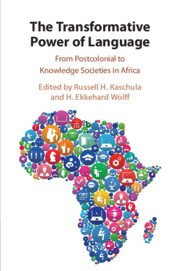Book contents
- The Transformative Power of Language
- The Transformative Power of Language
- Copyright page
- Contents
- Figures
- Tables
- Contributors
- Preface
- Abbreviations and Acronyms
- Introduction
- Part I Mental Decolonisation and Cultural Diversity
- Part II Multilingualism and Intellectualisation of African Languages
- 4 Transformative Power of Language Policies in Higher Education
- 5 African Languages in Transformation
- 6 Linguistic Diversity in Higher Education
- 7 An Impact Study with Reference to isiXhosa and Afrikaans Multilingual Glossaries for First-Year Law of Contracts Students at Cape Peninsula University of Technology
- 8 The Need for Multicultural and Multilingual Sensitivity in Transforming Graphic Design Curriculum in a University of Technology
- 9 An Analysis of the Language Legislation Effects in the Banking Sector
- Part III Digitalisation and Democratisation of Knowledge
- Part IV Interlingual and Intercultural Cross-Fertilisation
- Index
- References
4 - Transformative Power of Language Policies in Higher Education
A Legal English Approach or a Linguistic African Language Approach?
from Part II - Multilingualism and Intellectualisation of African Languages
Published online by Cambridge University Press: 18 September 2020
- The Transformative Power of Language
- The Transformative Power of Language
- Copyright page
- Contents
- Figures
- Tables
- Contributors
- Preface
- Abbreviations and Acronyms
- Introduction
- Part I Mental Decolonisation and Cultural Diversity
- Part II Multilingualism and Intellectualisation of African Languages
- 4 Transformative Power of Language Policies in Higher Education
- 5 African Languages in Transformation
- 6 Linguistic Diversity in Higher Education
- 7 An Impact Study with Reference to isiXhosa and Afrikaans Multilingual Glossaries for First-Year Law of Contracts Students at Cape Peninsula University of Technology
- 8 The Need for Multicultural and Multilingual Sensitivity in Transforming Graphic Design Curriculum in a University of Technology
- 9 An Analysis of the Language Legislation Effects in the Banking Sector
- Part III Digitalisation and Democratisation of Knowledge
- Part IV Interlingual and Intercultural Cross-Fertilisation
- Index
- References
Summary
The chapter sets out to critique and contextualise the largely monolingual language policies of universities in South Africa against the backdrop of transformation. The language question at higher education institutions in South Africa is explored with reference to the constitutional and legislative frameworks. The chapter argues that the trend towards enacting monolingual language policies at universities is mimicking the 2017 monolingual language of record directive for courts in South Africa. The chapter advances recent judgements, which serve as evidence that the judiciary, by finding that monolingual language policies are both constitutionally sound and ironically foster transformation based on access for all, is in fact pursuing an agenda that marginalises many people who do not have a functional knowledge of English. The authors grapple with the legal, sociopolitical and sociolinguistic complexities facing universities and how English is being portrayed as a language for all, yet the majority of the people speak an African language as their mother tongue. In conclusion, the authors propose recommendations for both the higher education institutions and the judiciary in South Africa.
Keywords
- Type
- Chapter
- Information
- The Transformative Power of LanguageFrom Postcolonial to Knowledge Societies in Africa, pp. 85 - 108Publisher: Cambridge University PressPrint publication year: 2020
References
References
Case Laws
Internet Sources
Legislation and Policies
Interview
- 2
- Cited by

